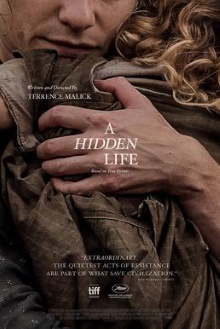I still consider The Tree of Life to be one of my favorite ever films but I haven’t anything Terrence Malick has made since then due to how awful the reviews are. This most recent one has been better received but still isn’t considered as good as his earlier work. Its subject is surely a worthy one, being one that fits well with Malick’s personal spirituality and it shows flashes of brilliance. But it also goes on for too long and feels too repetitive and you get the feeling that the people around him are just too reluctant to call out the grandmaster of cinema for merely passable work.
Franz Jägerstätter is a farmer who lives with his wife, Fani, and their daughters in the tiny village of St. Radegund in Austria. When war breaks out, he is called up and spends months in training as a soldier away from his family. He is disturbed by the war propaganda but after France surrenders, he is sent home without having to go on active duty. But as the war drags on and not to Germany’s advantage, the rhetoric against outsiders and foreigners worsens even in Franz’s village. He sees the hateful speech as being profoundly un-Christian and comes to believe that the war is unjust. Fani fully agrees and a few others quietly sympathize but everyone else seems to venerate the Nazis. When the men of his village are called back to duty again, Franz realizes that he is unable to swear an oath of allegiance to Adolf Hitler and refuses even to contribute to the war effort. He and his family are ostracized by the rest of the village and when he appeals to the moral authority of the Bishop of Salzburg, he learns that even the Church must bow to temporal authority. It soon becomes clear that Franz faces arrest and punishment for his refusal to swear loyalty but he persists in his quiet defiance, stating simply that his Christian faith allows him to do no less.
This is an unquestionably a great subject for a film and it should also be one that fits right in with Malick’s existing body of work. As you might expect, the director infuses every frame of the film with intense spirituality and, just as he usually does, tries his best to reach for the sublime. The scenery is of course breathtakingly beautiful including the shots of the village, the mountains surrounding it, their farm and so on, though as I understand it, this is not the real St. Radegund. I think however that Malick leans too heavily on the fisheye lens and the distortion is distracting when it is used even when Franz is in the village. Furthermore, while there are some truly great shots, others are merely passable. This is a far cry from the Malick of old who labored hard to ensure that every frame can stand alone and look exquisitely beautiful. Furthermore the shots and introspective musings feel too repetitive, especially as the film is so long. How many times does the audience need to be reminded of the qualia of wind, sun and rustling of foliage or the simple happiness of the family’s rustic life? The film tries too hard to be self-consciously sublime and so mostly fails in that regard.
I think this film shows what happens when a director becomes too comfortable with his chosen style and never bothers to innovate or improve beyond it. In this instance, the film steadfastly refuses to be grounded in a definite time and place, preferring instead to drift from moment to moment, linked by the inner thoughts of the characters and the letters between Franz and Fani. This is a mistake for a story that is based on real people and real events, and in which the historical timeline of events matters hugely. There should at least be some grounded moments in between these flights of introspection or else everything feels distant and not quite real. Similarly, when Franz tries to confront the church authorities about condoning evil on a massive scale, the conversations are oblique and the priests’ responses are evasive while Franz never calls them out on it. There is never an in-your-face, visceral moment of clashing perspectives. Malick is a director who hates direct conflicts and so even when the judge convicts him, the castigation is delivered in German and left untranslated, once again ensuring that there is layer of remove between the audience and the events.
In the end, this is still a reasonably good film, save for the fact that it goes on for far too long. It is disappointing mainly in that it falls well short of the excellence that Malick managed to achieve in his early films. It’s good that he continues to want to make films but sad as well that he seems fine with work that clearly isn’t as good. Finally most people watching this would probably be aware that Franz Jägerstätter was eventually beatified as a martyr by the Catholic Church but it’s worth noting that this only happened because later books and articles focused the public’s eye on the story of his life. It certainly wasn’t at the initiative of the church itself to correct their mistakes.
